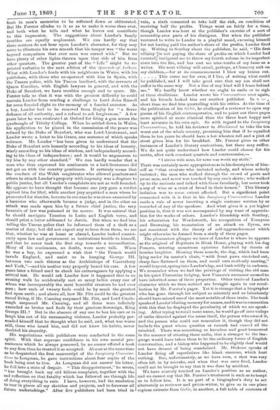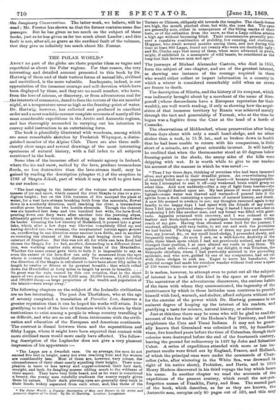" I strove with none, for none was worth my strife."
There was certainly more appropriateness in his description of himself as "that creature who imitated nobody, and whom nobody imitated ; the man who walked through the crowd of poets and prose men, and never was touched by any one's skirts ; who walked up to the ancients and talked with them familiarly, but never took a sup of wine or a crust of bread in their houses." This literary isolation was to some extent affected. But a significant point connected with it is that in his Imaginary Conversations Lander made a rule of never inserting a single sentence written by or recorded of any of the speakers. And what gives it a yet higher position is, that it was not accompanied by any want of appreciation for the works of others. Landor's friendship with Southey, his admiration for Wordsworth, his recognition of Tennyson and Browning, his recantation of an attack on Byron, are not consistent with the theory of self-aggrandizement which might otherwise be formed from a study of these pages.
The pleasautest glimpse we have of Landor is where he appears as the original of Boythorn in Bleak House, playing with his dog Pomero, uttering monstrous opinions followed by shouts of
leonine laughter. Hearing these sounds, the dog, which had been lying under its master's chair, " with front paws stretched out, sharp face flattened on them, and small ears restlessly moving," would leap out, spring into Landor's lap, and bark wildly in cadence. We remember when we had the privilege of visiting the old man in his quiet Florentine lodging, how Pomero's successor seemed to have inherited some of these properties. Other traits of Landor's character which we then noticed are brought again to our recollection by Mr. Forster's pages. Yet it is strange that a biographer who has gone through his subject so minutely and so laboriously should have missed one of the most notable of these traits. The book speaksof Landor's fai ling memory for names, and it was in connection with this that he displayed the peculiarity of which we are speaking. After trying to recall some name, he would go off into volleys of oaths directed against the name itself, the person who owned it,. and the person who could not remember it, though they did not include the guest whose question or remark had caused all the mischief. There was something so harmless and good-humoured in the manner of uttering these oaths, that a stranger to the language would have taken them to be the ordinary forms of English conversation, and a bishop who happened to be slightly deaf would not have dreamt of being scandalized. Mr. Dickens speaks of Landor firing off superlatives like blank cannons, which hurt nothing. But, unfortunately, as we have seen, a shot was very often left in by mistake, and when that was once fired, Landor could not be brought to say that it was done by accident.
We have scarcely touched on Landor's position as an author, and we cannot say that Mr. Forster's treatment is such as to tempt us to follow him. It is no part of a biographer's duty to act alternately as reviewer and precis-writer, to give us in one place copious extracts from Gebir, in another, a full table of contents of .,the Imaginary Conversations. The latter work, we believe, will be -read ; Mr. Forster has shown us that the former contains some fine passages. But he has given us too much on the subject of these books, just as he has given us far too much about Landor ; and this fault is not, after all, so grave as the cardinal fault of the volumes, that they give us infinitely too much about Mr. Forster.































 Previous page
Previous page